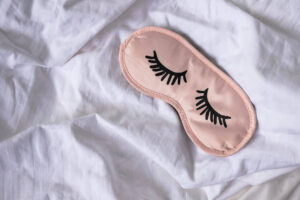One of the most important things we can do for our body is sleep. In fact, sleep deprivation is a extremely detrimental as our bodies need rest to have cellular turnover along with hormone and brain function.

Lack of sleep can also cause weight gain and increase risk for disease. A good night sleep is just as important as diet and exercise. There are times in your life where sleep may be more elusive than normal, such as parenting a newborn, pregnancy, sickness, grief, or big life stressor such as divorce, death, new job or moving. Yet often people experience a lack of sleep without any of these issues. To achieve better sleep, focus on the basics to establish new sleep hygiene.
- Create a schedule. Determine a consistent wake up and go to bedtime, even on the weekends. If you do sleep more on the weekends or on a day off, make sure the later wake up time doesn’t exceed an hour. Sleeping 7-9 hours is the goal.
- Don’t force yourself to go to sleep if you cannot fall asleep easily. If you are in bed in a dark, cold room with your eyes closed and have not fallen asleep after 20 minutes, then get up and do something calming. Some examples would be to read a book (actual book, not on your phone with blue light) or draw, both in soft, low light.
- Avoid any stimulate substances such as alcohol, caffeine, and nicotine, as they all affect your ability to fall asleep as well as the quality of the sleep that you do get.
- Avoid taking naps. It will make it more difficult for you to fall asleep. Naps that exceed an hour or are later in the day are especially harmful for your sleeping habits. If you must nap, keep it under 20 minutes to avoid going into a deep sleep, which will disrupt your nightly sleep cycle.
- Reduce blue light exposure in the evening. It affects your natural circadian rhythm and tricks your body into thinking it is daytime. Blue light glasses can help, but the best option is to avoid phones and televisions and electronic devices two hours before bed.
- Sleep Environment is crucial. Have a comfortable and relaxing bedroom. It should be quiet and dark and cool. Too hot temperatures can greatly disrupt sleep. If the environment is not conducive to sleep, utilize an eye mask, ear plugs or sound machine.
Habits and routines can be crucial in how well you sleep. It is important to dedicate enough time to rest. If you continually suffer from sleep dysfunction or overall lack of consistent and regular sleep, you might benefit from CBT-I, which is a therapeutic approach to address insomnia. You can experience benefits such as falling asleep easier, staying asleep longer and waking up less during sleep.
If you have a question you would like to ask or a topic to be addressed in next month’s article, please email jenn@pinkertonpsychotherapy.com. If you would like to schedule an individual appointment, please contact us at 713.800.6999 or www.pinkertonpsychotherapy.com.
Connect with Jennifer Pinkerton
Interested in scheduling an appointment, looking for more information, or for a qualified expert to speak at your next event?

